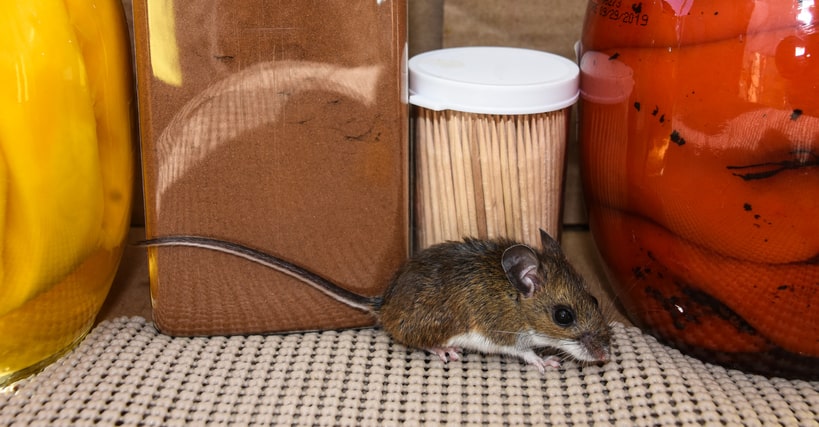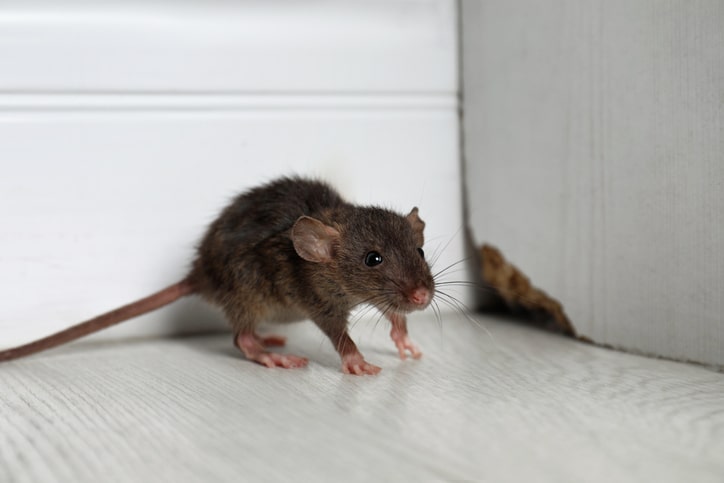No matter where you live, rodents are a constant. It’s not a matter of whether you will encounter a rodent in or around your home—it’s when. Contrary to popular belief, the cleanliness of your home won’t keep mice, rats, or other rodents from invading. When rodent deterrents don’t work, there are things you can do to keep them from entering your home in the first place. With a little bit of observation and strategy, you can discern why you have rodents in your house and create a plan to make your living space less appealing for them. If you’re sick of catching rats in your cabinets, don’t worry. You have options.
Allow Dewey Pest Control to show you how to get rid of rats and other common rodents that can pose a health risk to your family and a safety risk to your home. Worse comes to worst, you can always give us a call to find out how our rodent control services can restore your home to a rodent-free living environment for you and your family.
Types of Rodents
Obviously, when talking about the types of rodents found in your home, you have to consider the season you’re in. In California, it’s common to encounter rodents year-round, but it’s more common to see rodents in the winter when the temperatures drop and they’re more inclined to seek shelter over staying outdoors. While there are too many rodents to cover, we’ve addressed the most common rodents found in California below:
Rats
Rats are a common and widespread species of rodent, found all over the world. These small mammals have adapted to many different environments, making them one of the most successful and recognizable creatures in the animal kingdom. Rats are known for their intelligence, resourcefulness, and sometimes destructive behavior. They are also unfortunately common carriers of disease, which is one of the greatest reasons you would want to remove them from your house as soon as possible.
There are many types of rats in the world—and California alone—but they can generally be identified as having large eyes, long tails, and pointed snouts. They are typically nocturnal animals that feed on a variety of plants and insects as well as human food scraps. In addition to their scavenging abilities, they are liable to damage your home structures as well as garments in search of food and nesting material.
Mice
Mice, though smaller than rats, share many similarities. Not only are they omnivorous, but they also come in a number of sizes, shapes, and species. They’re generally lighter in color than rats but have a similar life expectancy, about one to three years depending on the species and environment.
The most common type of mouse found all around the world is the house mouse or field mouse. They typically have gray fur that may be lighter or darker depending on the subspecies and can survive in urban environments due to their adaptability and opportunistic behavior. House mice are usually nocturnal creatures that feed mainly on grains, cereals, and other food sources found in kitchen cupboards or pantries. As their name suggests, they prefer to be indoors rather than outside, which can be a big problem for many California residents.
Why Rodents Are in Your Home
Rodents like rats and mice are opportunistic and can cause extensive damage to your home if they find their way in. Not only can rodents ruin furniture and belongings with their sharp teeth, but they also carry a variety of diseases that pose health risks to humans. Knowing why these critters are attracted to a home is key in preventing them from entering. Luckily, the list of attractants is fairly short.
Food and Water
Mice and rats, like other rodents and pests, typically enter homes in search of food and water. These resources are the opposite of a rodent deterrent and part of the reason many rodent infestations start in the kitchen. Another place you may find rodents is in your basement or utility access where you’re likely to notice leaky pipes that serve as a water source for these scurrying menaces.
Shelter
While many parts of California don’t experience extremely cold temperatures, rodents still don’t want to be out in 50-degree weather, so they will seek warmth inside. If you have holes, cracks, or crevices around your home large enough for a rat or mouse to squeeze through, you can almost guarantee they will if it means a warm place to stay. Rodents will also begin taking things like lint, thread, insulation, and any other soft material they can get their hands on to build a comfortable nest for themselves.
How Do I Know Rodents Are in My Home?
Because rodents like rats and mice are nocturnal, it’s unlikely you’ll spot these critters during the day. Instead, you’ll want to keep an eye out for these signs of a rodent infestation around your home:
- Grease marks along your walls.
- Chew marks along your baseboards or even in packaged food.
- Rat and mouse droppings typically look like dark brown grains of rice.
At night, the signs of a rodent infestation are a little more obvious since that’s when rats and mice are the most active. You may hear scratching and skittering in your walls or attic that might keep you up or wake you at night. Mice specifically have poor eyesight, so they tend to run along the walls to get from one place to the other. You might see a flash of one of these little critters if you get up for a midnight snack.
How Do I Prevent Rodents in My Home?
We’ve established that rats, mice, and other rodents can be a nuisance, but with the proper preventive measures, you can discourage them from invading your space. To make your home less attractive to the types of rodents you’d rather stay outside, here are a few steps you’ll need to take to get rid of these annoying critters.
- Use containers. Keep all food sealed in airtight containers so rodents don’t have easy access to it.
- Keep clean. Be sure to clean up spills and crumbs promptly, and don’t let dishes collect anywhere in your home for too long.
- Employ repellents. Consider using repellents or traps near entry points such as doors or windows where rodents may enter the house.
- Seal up. Seal any holes or cracks around the exterior of the house that could serve as entry points for rats and other pests.
What are Some Different Types of Rodents?
What Do Rodents Eat?
How To Set a Mouse Trap
How To Get Rid of Mice and Other Pests With Dewey
Have you taken the precautions we listed above and still find rodents stubbornly returning time and again? It may be time to call in reinforcements and the professionals at Dewey Pest Control!
Rats and mice can be tricky to spot, and they can reproduce quickly, so it may not be easy to tell how bad your rodent infestation is until it’s too late. When you call our gopher or rodent services at Dewey, you can rest assured that we’ll conduct a thorough inspection of your property so we can determine where rodents might be entering and the severity of the infestation. Then we can provide a plan to help you get these critters out of your home or business.
Call upon Dewey to deal with this problem, and watch as your rodent problem goes away. Rodents in the house can be frustrating, but with Dewey’s effective pest control services, you can restore your peace of mind and enjoy being at home again. Give us a call to schedule your free consultation or contact us online today!



